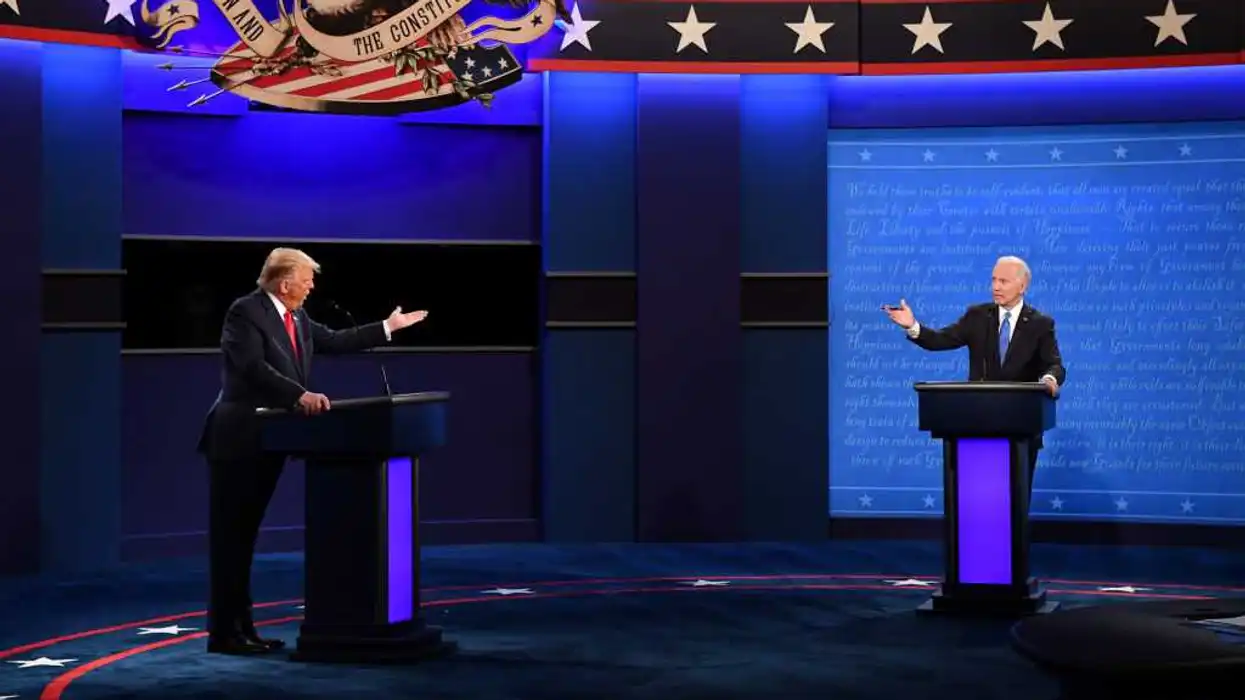 Israeli Prime Minister Benjamin Netanyahu, his wife Sara Netanyahu and sons Yair Netanyahu and Avner Netanyahu pose for a photograph after casting their ballot at a polling station on election day on January 22, 2013 in Jerusalem, Israel. (Photo: Getty Images)
Israeli Prime Minister Benjamin Netanyahu, his wife Sara Netanyahu and sons Yair Netanyahu and Avner Netanyahu pose for a photograph after casting their ballot at a polling station on election day on January 22, 2013 in Jerusalem, Israel. (Photo: Getty Images)
Israel Channel 2 has announced exit polls from Tuesday’s vote. Polls closed in Israel at 10pm (3pm eastern) and here are the exit poll results that predict how many of the 120 Knesset seats each party is likely to secure. Note: TheBlaze cannot verify the numbers, and caution should always be applied when examining exit poll results.
"Big surprises," said Israel Channel 2 anchor Yonit Levy.
Prime Minister Benjamin Netanyahu’s Likud-Israel Beiteinu party won 31 Knesset seats according to the exit poll. That’s a huge drop from the 42 seats it won in the 2009 election, but it is still the largest party in the Knesset, indicating Netanyahu will be tapped to form the next government.
The huge story of the night is Yair Lapid, who heads the new Yesh Atid ("there is a future") party. Yesh Atid is predicted to receive 19 Knesset seats, noteworthy considering the party was formed only a year ago and is headed by Lapid, a former journalist and political novice.
Channel 2 called the results "a real sensation." If true, that would mean Lapid edged out the Labor Party, becoming the second largest party in Israel.
 An Israeli Navy soldier casts his vote at an army Navy base in Ashdod, Israel. (Photo: Getty Images)
An Israeli Navy soldier casts his vote at an army Navy base in Ashdod, Israel. (Photo: Getty Images)
Lapid appealed to secular voters by campaigning on a platform of citizens sharing the burden more equitably, specifically that ultra-Orthodox Jews should be forced to serve in the military. Though there is a universal draft in Israel, the ultra-Orthodox “hareidi” Jews are exempted and even get a monthly government stipend to pursue Torah studies.
Throughout the day, Netanyahu traveled to polling stations around the country to warn of the low turnout in Likud strongholds and urged his supporters to vote. At one station, he said: "Reports are showing that voter turnout is lower than average in areas that traditionally support Likud. Likud voters of all ages – drop everything and go vote." By contrast, Israeli media reported voter turnout in left-leaning neighborhoods was high.
The Labor Party, headed by Shelly Yachimovich is forecast to secure 17 Knesset seats. Democratic pollster and former Bill Clinton strategist Stanley Greenberg advised the Labor Party’s campaign.
 (Photo: YNet News)
(Photo: YNet News)
Naftali Bennett’s Jewish Home Party – which opposes handing territory to the Palestinians in the framework of peace negotiations and promotes annexing parts of the West Bank – won 12 seats, an achievement considering this election marked Bennett’s entry into Knesset politics. A former commando and hi-tech millionaire, the 40-year-old politician attracted young, secular Israelis to his religious party.
Hatnua, a centrist party headed by former Foreign Minister Tzipi Livni, got 7 mandates. Her world-view will likely find favor with the Obama administration as she says she wants an immediate renewal of peace talks with the Palestinians, which have been dormant for the past two years.
Also in the center is Kadima whose leader is former IDF Chief of Staff and Defense Minister Shaul Mofaz and is predicted to not have passed the minimum threshold to secure Knesset seats.
On the far-left is Meretz, which obtained 7 seats, per the exit poll. Meretz supports handing over more parts of the West Bank to Palestinian control.
Channel 2 calculated that the left bloc will secure 59 seats opposite 61 for the right. Right after exit poll results were broadcast, a Likud spokesman urged caution, saying he would wait until the actual votes are counted.
In Israel, the drama continues after the election results are tallied. That’s when the bargaining with potential coalition partners begins.
If he is able to form a new coalition government, this will be Netanyahu’s third term in office, making him the second longest-serving prime minister since founding father David Ben-Gurion.
Challenges facing the next government include: How to handle the Iranian nuclear threat, rising Palestinian violence, how to contain any threat from the border with Syria which is embroiled in a two-year, bloody civil war, combating the terrorist threats from Hamas in Gaza and Hezbollah in Lebanon. These were the first Israeli elections since the so-called Arab Spring demonstrations brought to power Islamist regimes in the Arab world including neighboring Egypt. Besides the security threats, Israelis face economic challenges including high taxes which cobble away at their paychecks and sky-high real estate prices which prevent many young couples from buying their first apartment.
Netanyahu campaigned on his strong security positions, adopting the slogan “A strong prime minister, a strong Israel.”
British Foreign Secretary William Hague appeared to try to influence the Israeli vote, warning Tuesday that time is running out for a two-state solution, and pointing to the building of Jewish settlements as the main obstacle. “The two-state solution is slipping away,” he told the House of Commons.
 An Arab-Israeli woman marks her ballot behind a voting booth at a polling station in the northern Arab-Israeli town of Sakhnin on January 22, 2013. (Photo: AFP/Getty Images)
An Arab-Israeli woman marks her ballot behind a voting booth at a polling station in the northern Arab-Israeli town of Sakhnin on January 22, 2013. (Photo: AFP/Getty Images)
Though Likud-Israel Beiteinu received the most Knesset seats, Netanyahu still needs to form a coalition government with smaller parties, and it could take days or even weeks for Netanyahu to cobble together that coalition. Netanyahu could join forces with the Jewish Home party, headed by Naftali Bennett – a religious party that opposes any territorial compromise with the Palestinians, or he could choose to tack left and invite more centrist parties like Yesh Atid and Hatnua into his coalition. The latter choice would likely be met with approval by the Obama administration, which has been outspoken in its criticism of Netanyahu’s decisions to build more Jewish housing in the West Bank and east Jerusalem.
Haaretz reports that this is the first election in which citizens can follow the ballot counting in real time on the government’s Memshal Zamin website, or via a smartphone application. The paper estimates that 85 percent of the ballots will be counted overnight, with final results announced Wednesday.
Erica Ritz contributed to this report. This report may be updated.

 Israeli Prime Minister Benjamin Netanyahu, his wife Sara Netanyahu and sons Yair Netanyahu and Avner Netanyahu pose for a photograph after casting their ballot at a polling station on election day on January 22, 2013 in Jerusalem, Israel. (Photo: Getty Images)
Israeli Prime Minister Benjamin Netanyahu, his wife Sara Netanyahu and sons Yair Netanyahu and Avner Netanyahu pose for a photograph after casting their ballot at a polling station on election day on January 22, 2013 in Jerusalem, Israel. (Photo: Getty Images)






